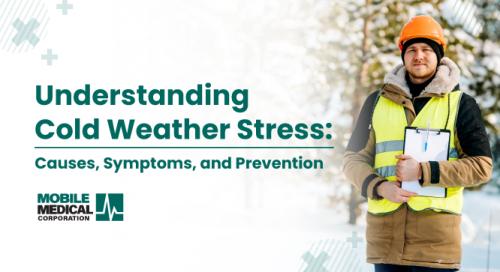As winter approaches, most people try to stay inside when possible. For those with outdoor jobs, however, working in the cold is inevitable. But frequent exposure to the elements is more than just unpleasant—it can make you sick.
What is Cold Stress?
Cold stress occurs due to prolonged exposure to extreme cold, wind chill, and dampness. These factors drive down the body's temperature, first at the skin level, then internally. The body is unable to warm back up, which can lead to serious injury, illness, and in severe cases, death.
Cold Stress Varieties and Their Symptoms
Almost all forms of cold stress will cause reddened skin, itching, tingling, pain, or numbness. However, symptoms and severity can vary depending on the exact conditions.
Frostbite
Frostbite occurs when the skin and underlying tissues freeze due to extreme cold. It most commonly affects the extremities, such as the fingers, toes, nose, and ears. Frostbite can cause permanent damage and require amputation in severe cases. Symptoms include reddened skin that develops white or gray patches, tingling, aching, numbness, and blisters.
Chilblains
Chilblains are inflamed blood vessels in the skin. It occurs when the skin is repeatedly exposed to cold, but not freezing, temperatures. They frequently occur on the fingers, toes, and other extremities. Symptoms include redness, itching, inflammation, blisters, and in severe cases, ulceration.
Trench Foot
Trench foot occurs when the feet are exposed to wet and cold conditions for an extended period of time. Dampness is the primary cause; so long as the feet are constantly wet, symptoms can develop in temperatures as high as 60 degrees. These symptoms include reddened skin, tingling, pain, numbness, blisters, swelling, and gangrene (complete death of the afflicted tissue).
Hypothermia
Hypothermia is an extreme form of cold stress that occurs when the body's internal temperature drops to abnormally low levels. Symptoms begin with numbness in the skin and uncontrollable shivering as the body attempts to generate heat. Next comes confusion, slurred speech, and loss of coordination. Shivering often stops at this stage; in severe cases, the victim may even feel suddenly warm. If left untreated, hypothermia will lead to an extremely low pulse, slow breathing, unconsciousness, and death.
Cold Stress Prevention
There are several preventative measures you can take to avoid getting sick from working in the cold.
Wear Appropriate Clothing
If you're going to work outside, be sure to dress appropriately. What exactly you can wear will depend on what your workplace will allow, but jackets, boots, warm socks, and insulated gloves are a must. Some clothes even make spaces for reusable heat packs, which provide added warmth.
Avoid Touching Cold Surfaces with Bare Skin
If you've ever grabbed a fresh ice cube and had it stick to your skin, you already know how painful it can be. Avoid touching cold metal or other frozen surfaces with your bare skin whenever possible.
Take Breaks in Warm Areas
Even if you're dressed for the weather, prolonged exposure to the cold can be dangerous. When possible, take breaks in heated areas. If no heated areas are available, look for dry spots shielded from the wind.
Pack High-Carb Snacks
Your body burns more calories in cold weather in order to maintain its internal temperature. Eating snacks high in carbohydrates can help you stay energized, which can help your body to stay warm.
Recognize Symptoms
If you experience early symptoms of cold stress, get to a heated area as soon as possible. If you are unable to do so before the symptoms become more severe, seek medical attention.
Use the Buddy System
While the necessity of this will depend on your work conditions, working in pairs can be a lifesaving measure. If one worker is incapacitated by the cold (or another injury) then their partner will be able to seek help. Paired employees can also hold each other accountable for taking breaks and staying as warm as possible.
Stay Warm with Mobile Medical Corporation
If your workers face the risk of cold stress, try MMC. Our onsite medical clinics come fully equipped with first aid, basic life support, and injury management services, meaning we can quickly treat the first signs of cold stress without leaving the worksite. Stay warm this winter and contact MMC today.



